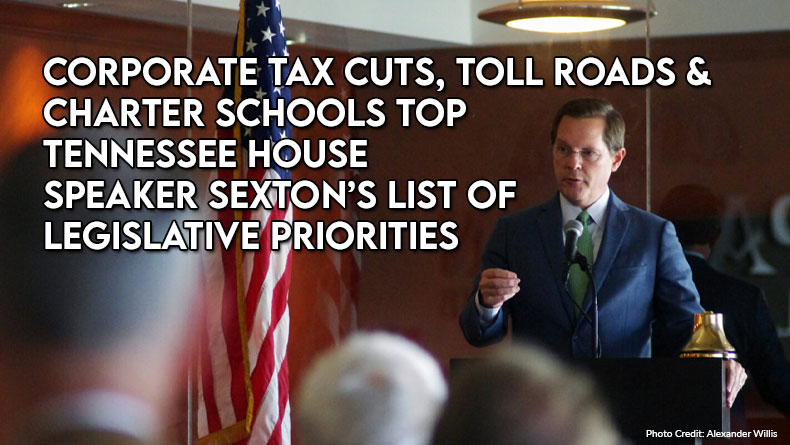“Choice roads,” corporate tax cuts and charter schools top Sexton’s list.
Photo: Tennessee House Speaker Cameron Sexton discussed his priorities for the legislative session at a Jan. 24 meeting in Nashville. Photo Credit: Alexander Willis
By Alexander Willis [Tennessee Lookout -CC BY-NC-ND 4.0] –
Tennessee House Speaker Cameron Sexton outlined his top legislative priorities for 2023 during a speech in Nashville Tuesday, among which were further reducing taxes on businesses, implementing toll lanes to mitigate the state’s traffic congestion issues, and integrating charter schools into the state’s education system.
A guest speaker at the weekly meeting of the Economic Club of Nashville, Sexton first assured the around 100 club members in attendance – mostly prominent business and community leaders – that despite some “worries about the economy,” the state of Tennessee was “in great shape.”
“You can see it in the economy, you can see it in the people who are moving here,” Sexton said. “You can see it here in Nashville, you can see it in Memphis, you can see it in rural parts of our state. We are doing very, very well.”

Tax cuts
While championing past tax cuts such as the elimination of the inheritance tax and the Hall income tax on dividends and investments, Sexton said there was another tax he had his sights set on reducing: the excise tax, a tax on corporate income that currently sits at 6.5%.
Tennessee falls in the lower half of states in terms of corporate income tax rates, which range from 2.5% to as high as 12%.
“One of the things we’ll look at hopefully in the next couple years is the excise taxes and trying to do a better job at lowering those to allow businesses to keep more, to be more competitive,” Sexton said.
“We’re really competitive right now with other states, but that excise tax [compared] to our surrounding states [is] a little higher, so we need to try to figure out how to adjust that.”
With the state of Tennessee holding approximately $1.4 billion in its rainy day fund, and sitting on billions more in unspent education dollars and sales tax revenue,
Tennessee House Democratic Caucus Chair John Ray Clemmons told the Lookout in response that prioritizing business tax cuts over investing in education or infrastructure “demonstrates a concerning indifference to the plight of workers.”
Pay the toll
Another priority outlined by Sexton was working on Tennessee’s traffic congestion issues, with the state currently facing $26 billion in unfunded traffic congestion projects.
“We can’t do everything in this state, that’s $26 billion for infrastructure and roads,” Sexton said. “We can just focus on congestion, [but] the problem is it takes 15 years for the state of Tennessee to build a road from start to finish on average.”
Sexton’s proposed solution, which he also named as his single-most important priority of 2023 — other than the state’s budget — is implementing toll lanes, also known as express lanes or choice lanes.
“We lease the land, [and] none of the roads you’re driving on currently would be affected at all, everything would stay free,” Sexton said. “The [only] new thing would be an express or choice lane.”
First proposed by Gov. Bill Lee on Jan. 5, the transportation proposal is expected to receive strong support among the Republican-controlled Tennessee General Assembly.
Sexton said he expects the project to get underway this year, and that the construction and management of the toll lanes would be executed through a public-private partnership.
Clemmons objected to the idea of putting public infrastructure in the hands of the private sector.
“Whether or not we have fast lanes or not is certainly a fair discussion,” Clemmons said. “What shouldn’t be on the table is the privatization of those roads, which would mean no accountability to the citizens.”
Competition in education
With Tennessee consistently ranking among the bottom five states in terms of public school funding per student, Sexton said pursuing a charter school model would also be a top priority of his this year, now more achievable than ever due to the Tennessee Investment in Student Achievement Act (TISA).
Signed into law last year, TISA is set to radically transform the state’s education funding system. Replacing the decades-old Basic Education Program model, TISA is designed to strategically distribute education funds based on factors such as income, population and student demographics, among other factors.
The new model also allows direct funding to public charter schools, schools that are publicly funded but privately operated. While charter schools are measured against identical academic standards to public schools, charter schools are generally less regulated and have more autonomy in designing teaching material.
“In education, a lot of people want to talk about the competition aspect,” Sexton said. “I like the competition aspect from charter schools, I prefer the charter school model.”
Sexton also advocated for implementing charter boarding schools, particularly in areas of the state with high crime.
“We know that there are kids in certain parts of our state who are in high-crime areas, and we’re okay with funding them when they go to prison, we’re okay with funding them with DCS (Department of Children’s Services) to DHS (Department of Human Services),” Sexton said. “This year we’re going to propose to do a public charter boarding school for kids who are at high risk. I think there are parents who would take that and run with it to protect their child, and I think it can make a huge difference long term for those kids.”
The debate over charter schools in Tennessee exploded last year after Lee announced a public-private partnership with the private Christian school Hillsdale College. While Lee touted the partnership as a “good fit for Tennessee,” critics questioned the idea of publicly funding a religious out-of-state institution whose president, Larry Arnn, was caught on video mocking public school teachers.
Sexton’s State House colleague Clemmons denounced the charter school model as a means to divert money from the public sector to the private sector.
“[TISA] gave them complete, unilateral authority to divert money from traditional public schools to private entities,” Clemmons told the Lookout.
“That TISA bill, unless amended or repealed, will be the single-most devastating piece of legislation to public schools in modern history. That sounds hyper-bolic, but that’s the absolute truth.”
Clemmons said state Democrats plan to introduce a number of bills to halt or amend TISA, but with a strong Republican majority across both the State House and Senate, these upcoming political disputes will likely be an uphill battle for Democrats.



